A video-postcard from Sebastian.
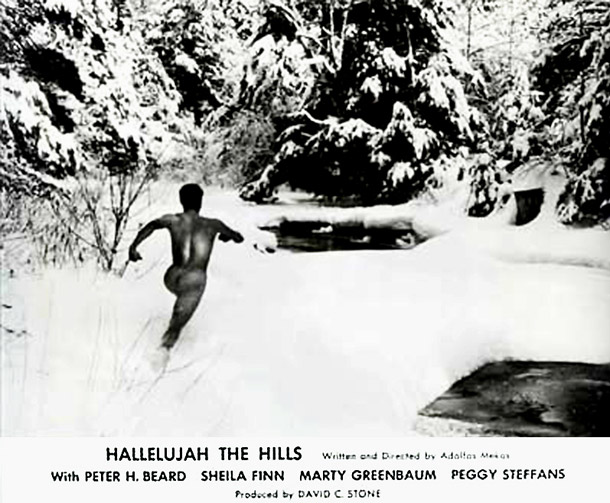
Monday, November 29, 7 p.m.
Microscope Gallery4 Charles Place
Bushwick
Brooklyn, NY 11221
tel: 347.925.1433
We begin the holiday season, with a rare screening of Adolfas Mekas’ “Hallellujah the Hills,” one of the classic, radical films of the 60s New American Cinema. The 82-minute black & white lyrical comedy will be projected in 16mm film. “Hallejuah the Hills” involves the loose story line of 2 men in love with the same woman and “stars” Peter Beard, Marty Geenbaum, Peggy Steffans-Sarno (in her first film), Jerome Hill, Taylor Mead and Shiela Finn.
Adolfas Mekas, born in Lithuania, arrived in the United States with his brother Jonas in 1949. They founded “Film Culture,” the magazine of independent cinema, in 1954. Adolfas Mekas’s Hallelujah the Hills bears witness to his knowledge and love of cinema, as well as the immense freedom to be found in all the films of the New American Cinema.
“Imagine a combination of Huckleberry Finn, Pull My Daisy, the Marx Brothers, and the complete works of Douglas Fairbanks, Mary Pickford, D. W. Griffith, and you’ve got it. What have you got? A film which is both deliriously funny and ravishingly lyrical….” The Guardian, 1963
“Even avowed enemies of the New American Cinema, so called, were impressed by the film’s lack of pretentions and its unexpected lyricism and Zen serenity in the midst of nervous parody.” Andrew Sarris, Village Voice, 1963
“Hallelujah the Hills is a gloriously funny and far-out farce about two great big overgrown boy scouts who pratfall in love with the same girl. The weirdest, wooziest, wackiest screen comedy…a slapstick poem, an intellectual hellzapoppin, a gloriously fresh experiment and experience in the cinema of the absurd, the first cubistic comedy of the new world cinema.” Time Magazine, 1963
“A satire on the American way of life, and at the same time a hymn to the joys of youth and friendship.” Richard Roud
Admission $6, tickets available at door
Many thanks to Adolfas Mekas and MM Serra (Film-makers’ Cooperative)
Watch the live webcast of Dalius Naujo, Jonathon Haffner, Kenny Wolleson, and friends — at the Ministry of Fluxus in Vilnius. The concert begins Saturday at 9 p.m. Vilnius time, 2 p.m. EST. Happy new year!
<< click here to view the webcast >>
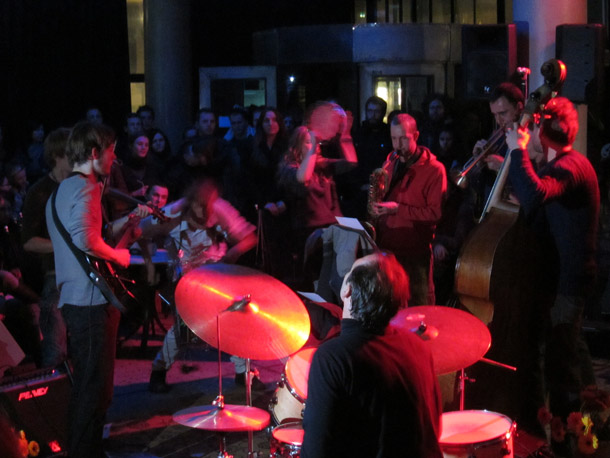
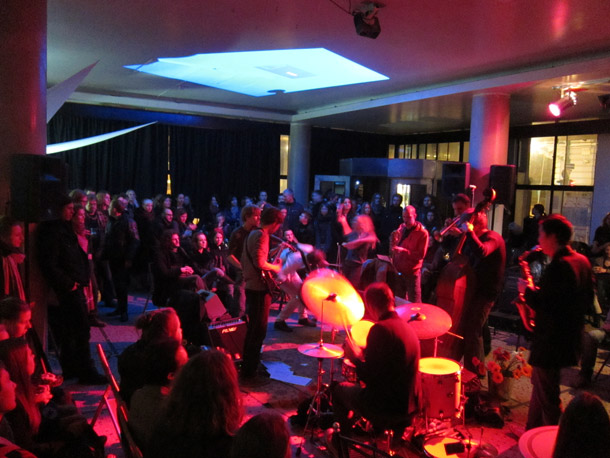
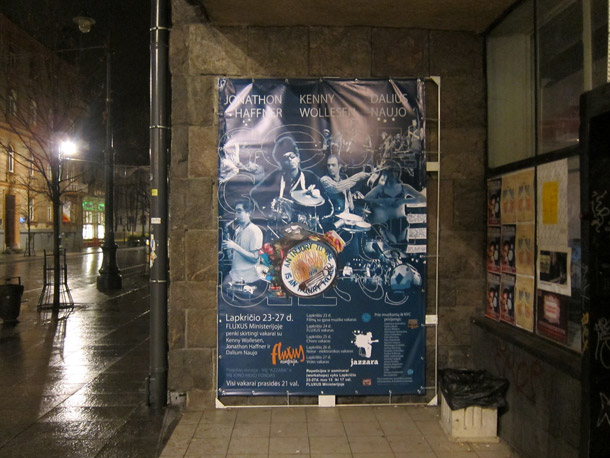
From the other week: Edward Eke’s performance of “A Requiem for the 20th Century”
at Shoreditch Church in London, November 11.
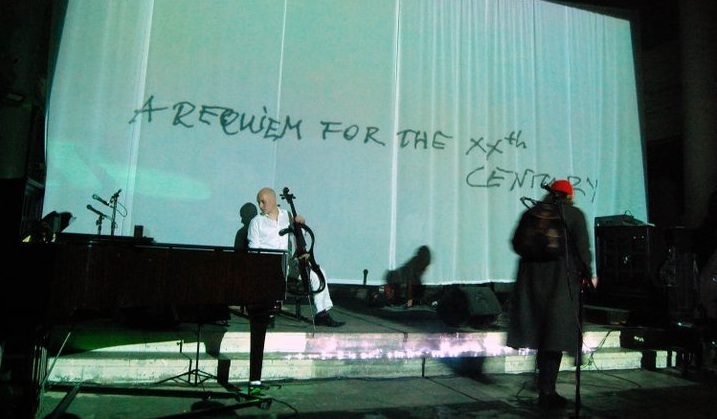
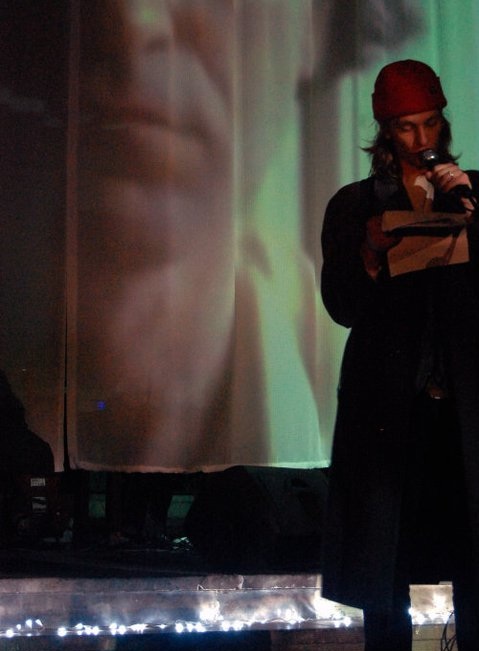
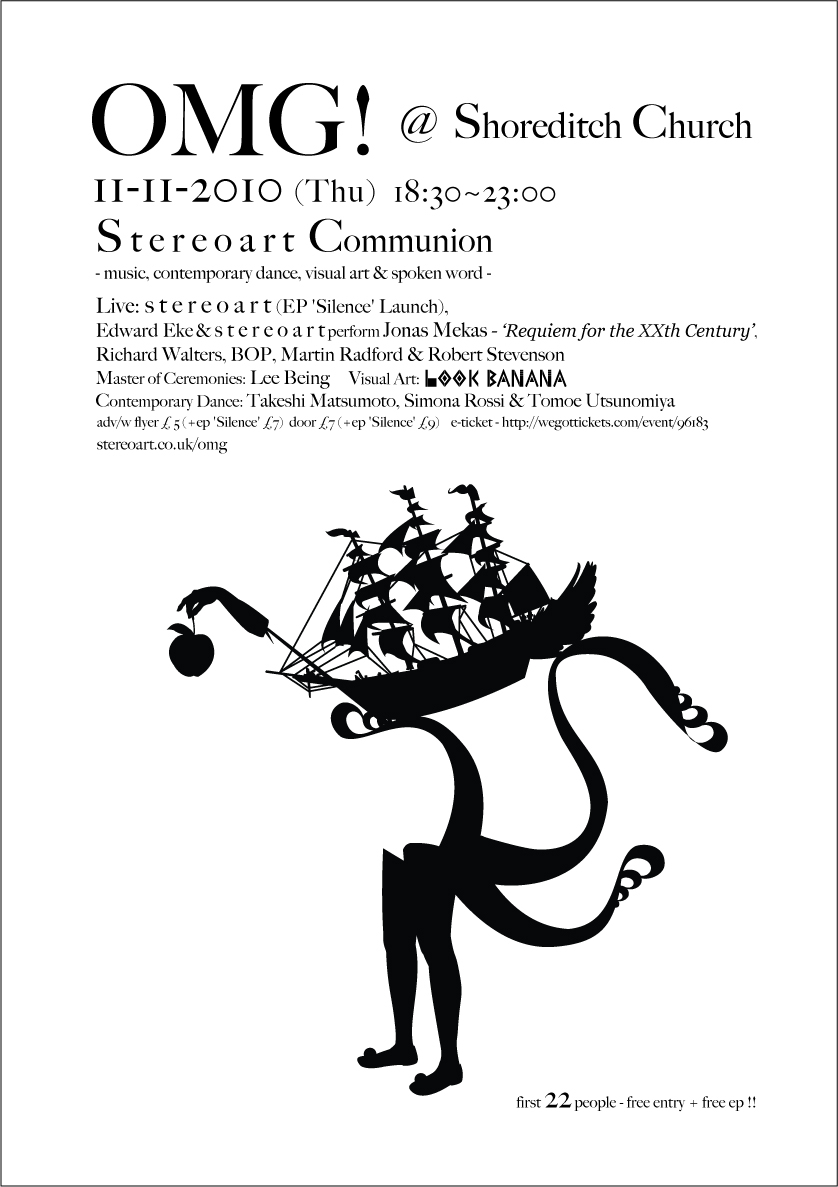
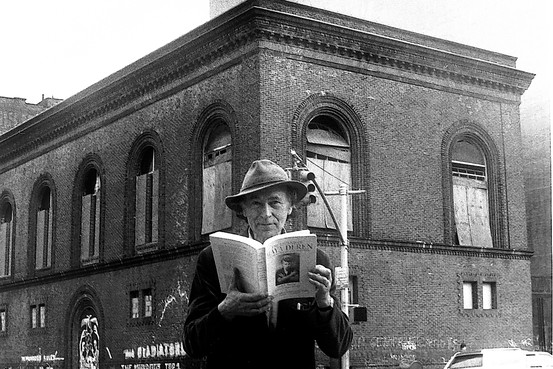
As part of the forthcoming series of events commemorating the 40th anniversary of Anthology Film Archives, the East Village bastion of avant garde cinema will screen “The Limits of Control,” the 2009 feature by writer-director Jim Jarmusch, on Thursday night. The film, which was programmed by Anthology’s 88-year-old co-founder and ongoing director, Jonas Mekas, and which will be introduced by Mr. Jarmusch, is an elusive hybrid of crime movie picaresque and boundary-testing stylistic exploration. As such, it occupies a unique on-screen creative space paralleling the singular archival and exhibition niche that Mr. Mekas—along with filmmakers Jerome Hill, Peter Kubelka, and Stan Brakhage, and film historian P. Adams Sitney—invented when Anthology was chartered four decades ago.
“It’s just a remarkable thing to have people dedicated to so-called non-commercial cinema, or avant garde cinema or whatever you want to call it,” Mr. Jarmusch said recently. The 57-year-old filmmaker is an enthusiastic fixture at repertory film screenings throughout the city, and is quick to delineate what sets Anthology’s calendar apart from the film programs at rep theaters like Film Forum, BAMcinématek and the Film Society of Lincoln Center. “Their film programs are incredible. I’m so happy they exist,” he said. “But Anthology is kind of its own feisty little pirate ship of cinema history.”
For Mr. Jarmusch, Anthology’s spirited curatorial mission— “Fueled,” according to the organization’s manifesto, “by the conviction that the index of a culture’s health and vibrancy lies largely in its margins”—is inseparable from Mr. Mekas’s personal enthusiasm for cinema. “I’m a big Jonas Mekas fan, so I’m always very curious about what the hell he’s got up his sleeve,” Mr. Jarmusch said.
Mr. Mekas and his theater each boast an unusual and sometimes trying personal history. A native of Lithuania, Mr. Mekas was imprisoned by the Nazis in 1944 before being brought to New York in 1949 by the United Nations Refugee Organization and settling in Brooklyn. At that time, the building at 2nd Street and Second Avenue that is now Anthology Film Archives was a satellite courthouse facility intended to ease congestion in Manhattan’s legal pipeline. Purchased by the nascent Anthology group from the city for $50,000 in 1979 and renovated at a cost of $1.45 million, Anthology’s permanent home was reopened in 1988 with screening rooms, storage and restoration facilities and an administration space where hearing rooms, judges chambers and holding cells had once been.
“It’s an ideal kind of space and it’s a really cool building,” Mr. Jarmusch said. “I love it because its function has been—what’s the word—hijacked by these pirates in a way.” He contrasted Anthology’s frugal co-opting of historically rich existing space with a considerably better-funded archival institution in his native Ohio: Cleveland’s Rock and Roll Hall of Fame and Museum.
…
Read the full article HERE.

“On the occasion of his recent solo exhibition To New York With Love at James Fuentes Gallery, Jonas Mekas, the indefatigable advocate of American independent cinema, graciously took the time out of his busy schedule to meet with the graduate students of the Art Criticism and Writing program at the School of Visual Arts for an in-depth conversation.”
Read the conversation in the November issue, or online at the Brooklyn Rail website.
Hans-Ulrich Obrist speaks with astronomer Dimitar Sasselov at MoMa PS1.